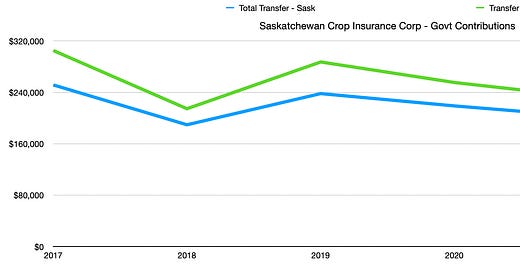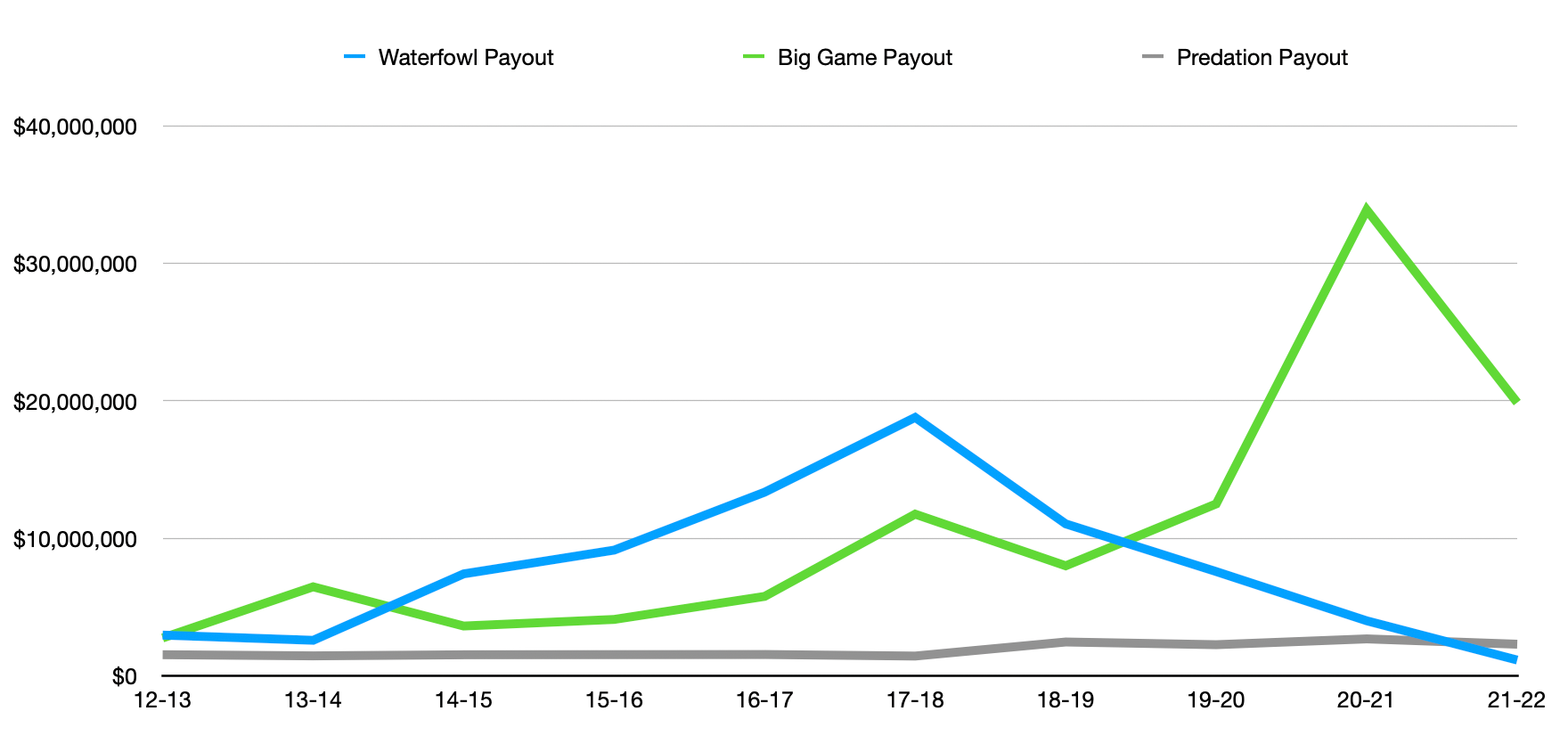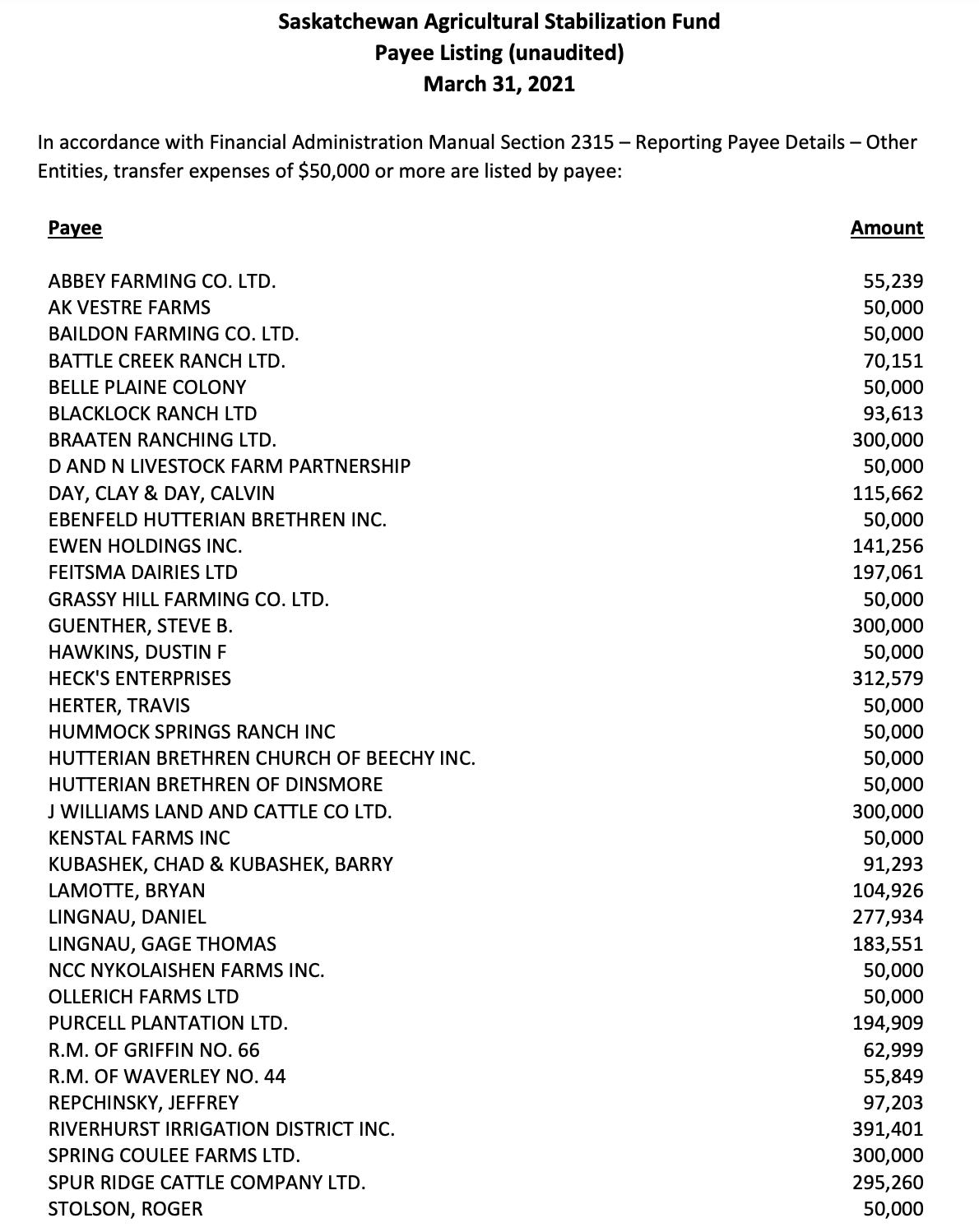We Need To Talk About Saskatchewan's Agriculture Stabilization Fund
Again. Urban taxpayers particularly need to read this.
Note - it’s December 2, 2023 and I’ve made a couple of housekeeping edits to this piece to clean up some typos, however none of the information or facts were changed.
Let’s be clear from the outset that I am not talking about the federal government’s Agristability program.
“AgriStability is one of the business risk management programs under the Canadian Agricultural Partnership. It protects Canadian producers against large declines in farming income for reasons such as production loss, increased costs and market conditions.” - Agriculture and Agri-Food Canada
AgriStability is delivered directly to farmers by the federal government in Manitoba, Newfoundland and Labrador, Nova Scotia, New Brunswick, and Yukon. The rest of Canada spends their share of the federal funding on their own provincial programs.
In Saskatchewan, farmers access AgriStability, which is a margin-based program, through the Saskatchewan Crop Insurance Corporation (SCIC). If the farmer’s margin falls 30 per cent below a “reference year margin”, for pretty much any risk-related reason at all, AgriStability, aka your tax dollars, will kick in 70 cents of every dollar of the decline to make up for it.
That happens with your business, right? You have a bad year and the government sends you a cheque?
Agristability is very much worth examining in respect to whether it’s a cost-effective, fair or appropriate way to use your tax dollars.
Remember friends, it really doesn’t matter which level of government spends the money because it’s all yours.
There is only one taxpayer - you.
However what we’re talking about today is Saskatchewan’s Agriculture Stabilization Fund (ASF). Until recently, the ASF only funded two programs that benefit farmers:
Wildlife Damage Compensation and Livestock Predation Prevention Program (WDCP)
Farm and Ranch Water Infrastructure Program 2018 (FRWIP 2018)
In 2020-21, the Sask Party announced three more programs:
Western Livestock Price Insurance Program (WLPIP) Premium Rebate
Drought Response Initiative Program
The Saskatchewan Livestock Set Aside Program
All five are gratuitous AF and taxpayers, particularly urban, are paying for it
The only place you’re going to find information on the ASF is by finding the document on the Government of Saskatchewan’s Publications website that lists all arms-length government funds and their financial statements. It’s impossible for the average taxpayer to find, but you can download it here if you’re interested in seeing the list of sluice funds the Sask Party operates with relative autonomy and very little accountability.
Some of them have more legitimacy than others.
I wrote about the ASF in 2017.
I was specifically aghast at the money spent on the Wildlife Damage Compensation Program (WDCP).
“Between 2011 and 2016, the Saskatchewan government paid out $3.6 million to farmers who lost animals to predators (in addition to the $5.4 million paid by the feds).” - Me, 2017
OMG I was adorable. Imagine if I knew then that six years later, that number would quadruple or more on an annual basis.
Actually, if I knew anything back then about what was going to happen in Saskatchewan six years later, I can’t see myself having believed it.
But I digress.
The WDCP provides free money to farmers for 100 percent compensation on a claim of crops damaged by a long list of wild animals native to the prairie they do business on, including:
ducks,
geese,
sandhill cranes,
white-tailed and mule deer,
antelope,
elk,
bison,
moose,
bear
wild boar
beavers
and blackbirds.
That’s 100 percent compensation with no cap on the amount paid out.
Under WDCP, farmers can also receive 100 percent compensation if a predator gets their livestock or poultry and up to 80 percent of the animal’s value to cover veterinary costs if it gets injured instead of killed.
Further WDCP cash is available for preventative measures to reduce crop and predation losses, like guard dogs and fencing. You know, the kind of guard dogs and fences rural Saskatchewan producers used to buy for themselves - because they lived in rural Saskatchewan.
Bottom line is in the last ten years, over $200-million has been doled out to Saskatchewan farmers just to battle back deer, geese, foxes and coyotes.
On the prairie.
It’s amazing that our parents, grandparents and great-grandparents somehow managed to get by on Saskatchewan farms without the government holding both their hands, wiping their noses and swaddling them in bubble wrap.
There are no premiums paid by farmers for the cushy little ASF business backstop and while SCIC administers the program, farmers do not need to be on contract with SCIC to access it.
Funding for this nonsense is split 60 percent with the evil, Saskatchewan-hating Trudeau government and 40 percent with the provincial government, up to 80 percent of the farmer’s claim.
The Sask Party then generously tops up the additional 20 percent with more of your provincial money, just to really load up this gravy train as much as possible.
The combined cost to the Saskatchewan taxpayer to fund all five agricultural-welfare programs I listed above, through the ASF was $141-million in 2021-22 alone.
When you toss in the federal money - which is paid by all Canadians, particularly in Quebec and Ontario - the total paid out to Saskatchewan farmers from the ASF in 2021-22 was $328-million.
Keeping in mind that they’ve gone from two agri-socialism programs to five in the last five years, here’s what these payouts have looked like.
This is over and above what farmers receive from SCIC.
By the way, this is what SCIC is costing the Saskatchewan and Canadian taxpayer, every year:
Half a billion dollars per year in welfare for Saskatchewan farmers.
Yes, that does not include the premiums paid by SCIC clients, which barely cover about a third of what the taxpayer pumps on top of that to keep these farmers afloat.
Think about that.
What other industry or sector gets that kind of free money?
The federal tax dollars are provided by the same eastern Canadian, urban liberal elitists who Scooter Moe, his cronies and most rural Saskatchewan residents love to whine and complain about (when they take five seconds to spit the government tit out of their mouth).
Thank heavens for those eastern Canadians, because Saskatchewan residents sure can’t prop up this many farmers on welfare on our own.
In 2019 the Sask Party government was forced to begin publishing recipients of the ASF who received over $50,000. You can find those lists on the Publications website by searching “table of contents payees” (obviously, I mean that makes total sense), but I don’t recommend trying. It has taken me years to hack the efforts made by the Sask Party to obscure this kind of information.
Anyway, the 2019-20 list was pretty benign.
A couple are Sask Party donors, but I’m not going to run the ISC documents on all these because the cost of the Donors series I’m writing is completely out of control, so we’ll all just have to guess.
Clearly in 2019-20, a ton of payments were made under the $50,000 threshold.
Namaka Farms, recipient of a cool $300K in 2019-20, is based in Alberta and likely doesn’t even pay taxes in Saskatchewan. Lol.
In 2020-21 things levelled up a bit, but everyone still fits on one page:
Why are so many of these perfectly rounded numbers, when presumably they’re supposed to be covering actual invoices?
Who knows.
Why does Ewen Holdings and Purcell Plantation Ltd (who calls anything a “plantation” in the twenty-first century?) each need almost a quarter of a million dollars over two years?
Who knows.
Why are these lists unaudited - who audits this Sask Party-driven political sluice fund?
Who knows.
2021-22’s ASF payee list is 33 pages long.
I’m not going to to screenshot it all, obviously, but you can view it by downloading the government’s list of payee reports for that year, then selecting the Saskatchewan Agricultural Stabilization Fund report.
Here’s what I will show you:
Dozens of numbered companies received payment for drought, including two from Alberta.
Again, I’m not pulling the corporate documents for those companies from ISC because it would cost hundreds of dollars and it’s just too costly for me right now.
(This seems like a good spot to make my appeal:)
I’ve (uncomfortably) mentioned a few times that researching and writing this Substack is proving expensive, as every one of the hundreds of ISC documents I need to write this series cost money to obtain from ISC’s corporate registry. If they’re registered in Alberta or other provinces, which many are, it’s even more time-consuming and expensive.
I’m the only one in Saskatchewan doing this work, so if you would like to chip in on so I can keep it coming, you can etransfer me at tammyrobert0123@gmail.com. I’ll channel my best Sally Struthers and say that every dollar helps.
Thank you so much to all of you again for your readership, subscriptions and support. I am so grateful - I have the best audience in Canada. T.
Here’s a few other tidbits that some of you might be interested in:
Melnychuk Farms Ltd received over half a million dollars in compensation for damage to their operation caused by wildlife, followed closely by Rick Freeman Farms Ltd at $466K;
dozens, maybe more, of companies paid out by the ASF for drought in 2020-21 are headquartered in Alberta;
the Sask Party’s long time (now former) president got over $60,000;
the largest payment for drought, over a million dollars, went to Primrose Livestock, a massive commercial operation headquartered (aka paying corporate taxes) in Alberta;
Brian, Kolton, Richard and Tyler Yasieniuk received just shy of $900K combined;
at least a dozen payments were made in the $400K - $500K range;
almost every producer who received payment from the ASF in previous years hit it up again in 2021-22 - so I’m going to go out on a limb and suggest maybe it’s you and you should find a new line of work.
What I can guarantee is that of the approximately 1700 Saskatchewan farming operations that raked in hundreds of millions of tax dollars, over half of which was provided by the federal government, 99 percent drive of them around with a F*ck Trudeau sticker on their truck.
A truck that Justin Trudeau probably bought for them, with welfare dollars these farmers grift off the feds like it’s going out of style.
What a bunch of hypocrites.
I’ve had about enough of farmers in Saskatchewan. They’re propping up a provincial government that doesn’t give a shit about them, because if it did they’d at least have 21st-century wifi and wouldn’t be getting squeezed out by massive corporate landowners who, thanks to the Sask Party, are going to drive their family farm into the ground.
Meantime, those same farmers continue to feast like pigs at the federal trough while simultaneously, loudly publicly gnawing on the hand that feeds them.
Like, how stupid do these people want to look?
I lay a lot of blame on the total lack of leadership inside the province’s agriculture sector, including the ineffective, unsophisticated, white male-dominated lobby groups that claim to represent rural Saskatchewan and its needs. The entire reason those groups exist seems to be to trot off to Ottawa to pose in cowboy boots on Parliament Hill with a bunch of useless Conservative Party backbenchers, instead of educating and leading the industry and province they poorly represent.
Toss in people like Levi “Dugout” Woods (who appears to have received drought funding, but I’m not paying to confirm his company name), Jason LeBlanc and the Little Dick Youtuber, who enjoy high Saskatchewan, agriculture-based profiles for their lowbrow, red-necked schtick, you have nothing but a stain on our province.
Have a great weekend, Saskatchewan.
I know it’s Friday, but you’d best get your butt back to work, cause those agriculture operations in your area aren’t going to pay for themselves. Clearly.
PS: Have you checked out my new Substack?
It’s quite a bit more personal, therefore you have to request approval to subscribe, but so far there’s just been a couple of psychos I’ve had to decline so don’t let that dissuade you! If I don’t recognize the email address or your handle, I will reach out to you.










